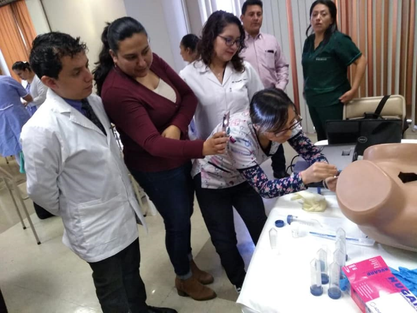Health, demographic change and wellbeing - ELEVATE
Introduction
ELEVATE stands for ‘EarLy dEtection of cerVical cAncer in hard-to-reach populations through portable and point-of-care HPV Testing’.
The ELEVATE consortium aims at developing a self-testing tool to empower women to screen for cervical cancer in any setting providing rapid and easy-to-understand results.
The project brings together a team of medical doctors, public health researchers, economists, biological engineers, and technology developers from several European and Latin American countries. The consortium consist of 9 partners: 6 universities and 3 non-academic partner organizations.
The project is coordinated by Prof. Olivier Degomme (Ghent University/ICRH, Belgium) and will run from January 2019 until December 2023.
Project description
Cervical cancer, caused by the sexually transmittable Human Papillomavirus (HPV), is the fourth most prevalent cancer among women worldwide, even though it is detectable and preventable in pre-malignant stages through screening and early treatment. However, cervical cancer screening is often a time consuming and stressful event that requires a gynecological examination. As a result, it is not adapted to women who are hard to reach due to social, geographical or other contextual barriers. A more accessible test, based on self-sampling, could increase cervical cancer screening in low-income or isolated populations, but also among women in general who for a variety of reasons do not attend regular screenings.
The ELEVATE consortium aims at developing a user-friendly portable, point-of-care HPV self-testing device that yields rapid, easy-to-understand results, and does not require any electrical outlets or specialized health personnel. The test will detect and identify both the human papilloma virus and cancer biomarker proteins to obtain a more complete and specific view on the risk of developing cervical cancer, so that a clear follow-up path can immediately be defined.
The new HPV self-testing tool will be piloted among hard-to-reach populations in a variety of countries (Belgium, Brazil, Ecuador and Portugal): by using a community-based participatory approach the study will test the user acceptability and the cost-effectiveness of the new screening tool. Ultimately, all acquired knowledge allows for optimized screening initiatives that will enhance participation among hard-to-reach women, and will feed into further refinement of national health strategies for cancer prevention in Latin-America and Europe.
Objectives
These are the objectives of ELEVATE:
• To identify hard-to-reach women and define a strategy to increase their participation in Belgium, Brazil, Ecuador, Portugal
• To improve detection of infections by designing a HPV genotyping test (14) with detection of 2 protein cervical cancer biomarkers
• To develop a portable genomic/proteomic testing device using the new test for detection at point-of-care in low-resource settings
• To determine the user-acceptability and cost-effectiveness of the new screening intervention in Belgium, Brazil, Ecuador, Portugal
Role of Ghent University
Ghent University coordinates the overall project. In addition, researchers from the International Centre for Reproductive Health (ICRH) and Center for MicroSystems Technology (CMST) work closely together to fulfill the various tasks of the project in Belgium.
Website
Contact
Prof. Olivier Degomme
Department of Public Health and Primary Care
Phone number: +32 9 332 36 28
E-mail
